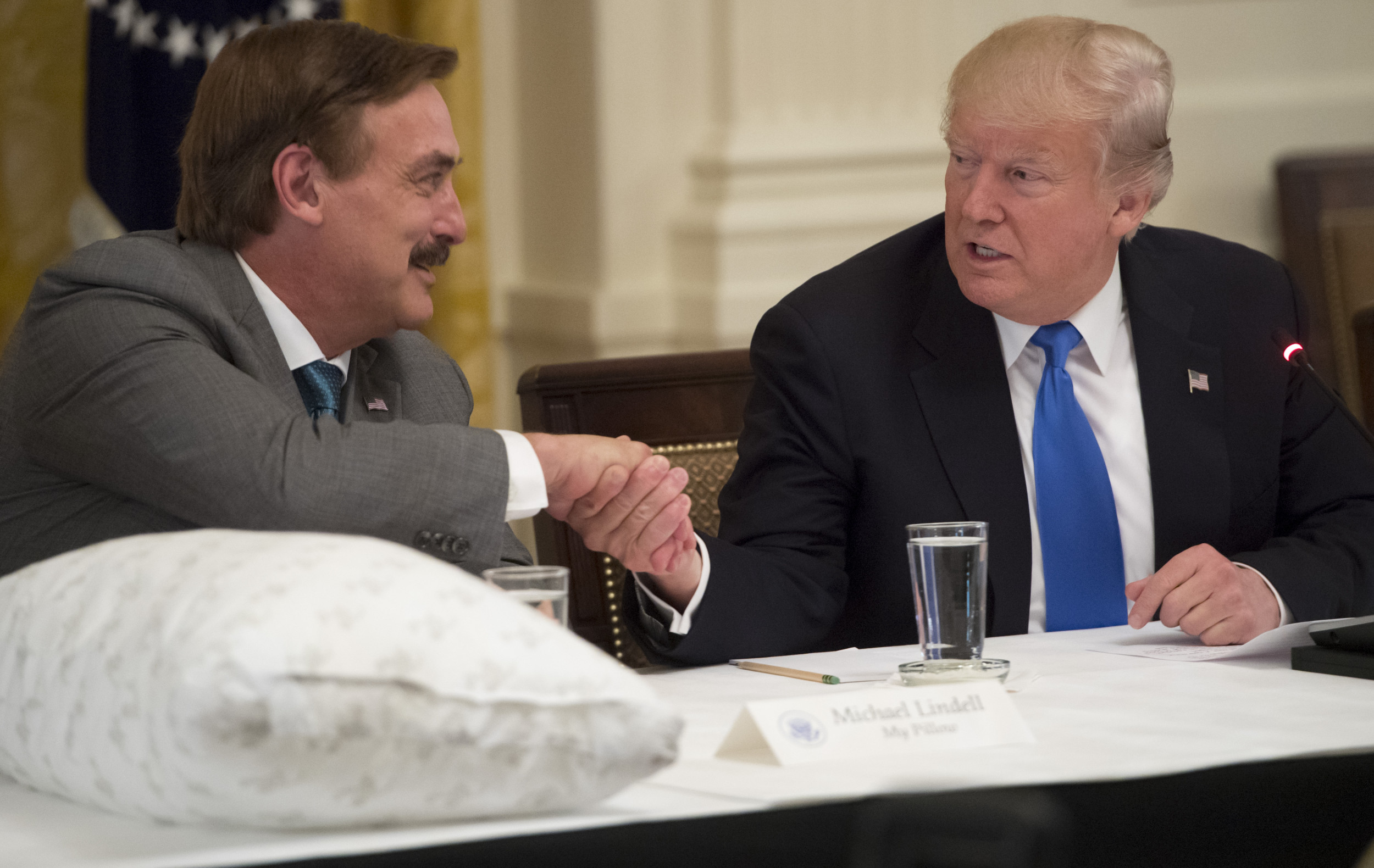Mike Lindell: MyPillow CEO, Election Fraud Allegations, And Conspiracy Theories, a topic that has gained significant attention in recent times, has become a subject of discussion and debate.
Editor's Notes: "Mike Lindell: MyPillow CEO, Election Fraud Allegations, And Conspiracy Theories" have published today date due to the need of people to know the truth and to give a clear and concise article about it.
Through analysis and digging information, we have put together this Mike Lindell: MyPillow CEO, Election Fraud Allegations, And Conspiracy Theories guide to help you make the right decision.
Key differences or Key takeways
Transition to main article topics
FAQ
This FAQ section provides answers to commonly asked questions surrounding the allegations of election fraud made by Mike Lindell, CEO of MyPillow, along with his history of promoting conspiracy theories. Mike Lindell: MyPillow CEO, Election Fraud Allegations, And Conspiracy Theories

Mike Lindell's MyPillow Empire is Unraveling - Newsweek - Source www.newsweek.com
Question 1: What are Mike Lindell's specific allegations of election fraud?
Mike Lindell has repeatedly made unsubstantiated claims alleging widespread voter fraud during the 2020 US presidential election, suggesting that millions of illegal votes were cast.
Question 2: What evidence has Lindell presented to support his claims?
Despite numerous requests, Lindell has failed to provide any credible evidence to back up his allegations. Many of his assertions have been debunked by election officials, fact-checkers, and courts.
Question 3: Has Lindell's promotion of election fraud theories been widely disputed?
Yes, numerous investigations, audits, and recounts conducted by election officials, both Republican and Democrat, have found no evidence of widespread voter fraud that would have affected the outcome of the 2020 election.
Question 4: Has Lindell made other controversial claims in the past?
Yes, Lindell has a history of promoting various conspiracy theories, including baseless claims about the COVID-19 pandemic. He has also expressed support for far-right extremist groups.
Question 5: What are the potential consequences of spreading false information about election fraud?
False claims about election fraud can undermine public trust in the electoral process and sow division within society. It can also contribute to dangerous rhetoric and potentially incite violence.
Question 6: Where can I find more reliable information about election integrity?
For accurate and up-to-date information about election integrity, refer to official sources such as the US Election Assistance Commission, state and local election officials, and reputable news organizations.
Summary: Mike Lindell's allegations of election fraud lack credible evidence and have been widely disputed. Promoting false information about election integrity can have serious consequences for public trust and social cohesion.
Next Article: Explore the latest developments in the ongoing investigation into election fraud allegations.
Tips
Election fraud remains a frequently discussed topic in modern society. Understanding how to evaluate potential fraud claims can help navigate these discussions effectively.
Tip 1: Examine Evidence Objectively
Avoid relying solely on emotional appeals or unverified claims. Seek credible sources that provide evidence to support allegations and assess its reliability based on documentation, expert analysis, and fact-checking.
Tip 2: Consider Context and Timing
Review whether fraud allegations emerge before, during, or after an election. Examine if they align with established patterns or timelines for reporting irregularities. Contextualizing allegations can help identify potential biases or ulterior motives.
Tip 3: Seek Expert Perspectives
Consult nonpartisan experts, election officials, and researchers for their insights on fraud claims. Their experience and understanding of election systems can provide valuable perspectives on the validity and significance of allegations.
Tip 4: Evaluate Statistical Claims
Scrutinize statistical claims used to support fraud allegations. Verify data sources, methodologies, and assumptions used in the analysis. Be wary of selective or incomplete data presentation that may distort conclusions.
Tip 5: Beware of Bias and Motives
Consider the potential biases or motivations of individuals or groups making fraud allegations. Examine their political affiliations, personal interests, or past involvement in similar controversies. Understanding their perspectives can help identify potential agendas or biases.
Evaluating election fraud claims requires a balanced and critical approach. Objectively examining evidence, considering context and timing, seeking expert perspectives, scrutinizing statistical claims, and being aware of potential biases is crucial for informed decision-making.
Mike Lindell: MyPillow CEO, Election Fraud Allegations, And Conspiracy Theories
Mike Lindell, the CEO of MyPillow, has been a vocal proponent of unsubstantiated claims of widespread election fraud in the 2020 United States presidential election. Lindell's allegations have been widely disputed by election officials and experts, and his claims have been rejected by courts. However, Lindell has continued to promote his conspiracy theories, often appearing on conservative media outlets to make his case.

Donald Trump Fumes Over Mike Lindell Phone Seizure, Blasts 'Weaponized - Source www.newsweek.com
- MyPillow CEO: Lindell's business success has provided him with a platform to promote his views.
- Election Fraud Allegations: Lindell's claims of widespread voter fraud have been repeatedly debunked.
- Conspiracy Theories: Lindell has embraced a wide range of conspiracy theories, including QAnon.
- Conservative Media: Lindell has found a sympathetic audience for his views on conservative media outlets.
- Legal Challenges: Lindell's claims have been repeatedly rejected by courts.
- Political Implications: Lindell's allegations have contributed to the erosion of trust in the electoral process.
Lindell's persistent promotion of conspiracy theories has raised concerns about the potential for violence and the erosion of trust in democratic institutions. His claims have also been used to justify restrictive voting laws that could disproportionately impact marginalized communities. The spread of misinformation and the erosion of trust in the electoral process pose significant challenges to American democracy.
Mike Lindell: MyPillow CEO, Election Fraud Allegations, And Conspiracy Theories
Mike Lindell, CEO of MyPillow, has been a vocal supporter of former President Donald Trump since 2016 and has consistently made unfounded claims of election fraud in the 2020 presidential election. Lindell has used his platform and financial resources to promote conspiracy theories about the election, including the false claim that voting machines were hacked to change votes from Trump to Joe Biden.

Mike Lindell Has A Plan To 'Get Rid Of The Machines Once And For All - Source crooksandliars.com
Lindell's allegations have been widely debunked by election officials, cybersecurity experts, and the courts. However, he has continued to promote these claims, often using inflammatory and baseless rhetoric. Lindell's actions have been condemned by many, including some Republicans, who have accused him of undermining trust in the electoral process.
The connection between Mike Lindell, MyPillow CEO, election fraud allegations, and conspiracy theories is significant because it highlights the growing problem of misinformation and disinformation in the United States. Lindell's claims have been amplified by social media and right-wing media outlets, reaching millions of people who may not be aware of the facts. This has contributed to a decline in trust in the electoral process and made it more difficult for people to have informed conversations about politics.
It is important to be aware of the dangers of misinformation and disinformation and to be skeptical of claims that are not supported by evidence. We must also be mindful of the role that social media and other online platforms play in spreading false information. By being informed and critical consumers of information, we can help to combat the spread of conspiracy theories and protect the integrity of our democratic institutions.
| Claim | Evidence | Debunking |
|---|---|---|
| Voting machines were hacked to change votes from Trump to Biden. | None | Election officials, cybersecurity experts, and the courts have all debunked this claim. |
| There was widespread voter fraud in the 2020 election. | None | There have been no credible reports of widespread voter fraud in the 2020 election. |
| The election was stolen from Trump. | None | There is no evidence to support this claim. Trump lost the election fair and square. |
Conclusion
Mike Lindell's election fraud allegations are a dangerous and unfounded attack on our democracy. His claims have been repeatedly debunked, but he continues to promote them, undermining trust in the electoral process. It is important to be aware of the dangers of misinformation and disinformation and to be skeptical of claims that are not supported by evidence. We must also be mindful of the role that social media and other online platforms play in spreading false information. By being informed and critical consumers of information, we can help to combat the spread of conspiracy theories and protect the integrity of our democratic institutions.
The future of our democracy depends on our ability to have informed and honest conversations about politics. We cannot afford to let misinformation and disinformation divide us and undermine our trust in our institutions. We must work together to promote a culture of truth and accountability, and to ensure that our elections are free and fair.
